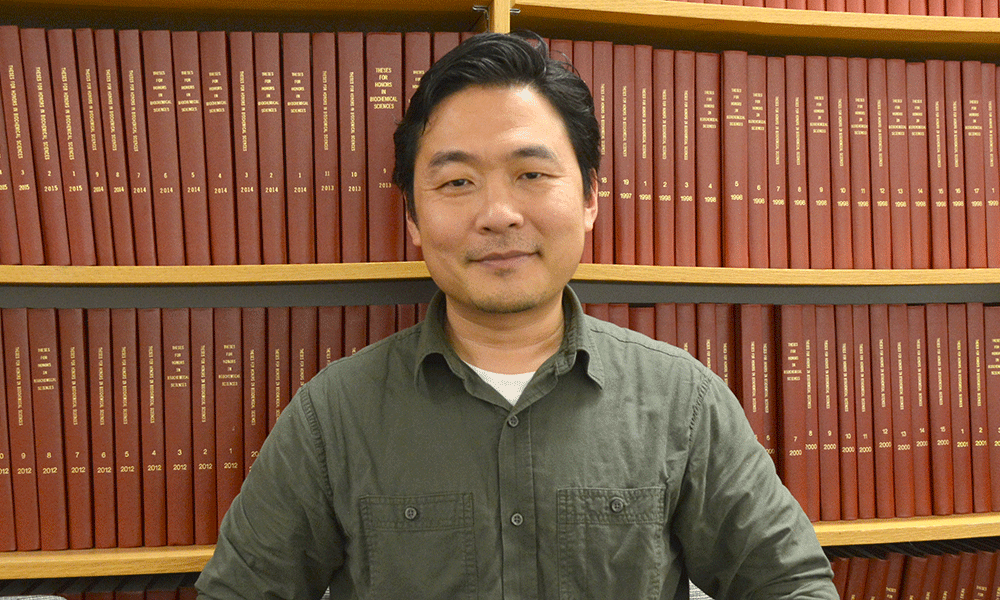This coming January, a team of Harvard students and staff will travel to India to lead an educational workshop that will enable Indian high school students to explore a liberal arts and sciences curriculum. This initiative, called Program for Scientifically-Inspired Leadership (PSIL), is the brainchild of Assistant Director of Undergraduate Studies in MCB and CPB Dominic Mao, who was born and raised in the eastern Indian state of Manipur.
This year, PSIL is partnering with the Backward Classes Welfare Department (BCWD) of Telangana State—a government agency that is tasked with the welfare of citizens from disadvantaged groups, formally classified as “backward classes.” The student participants will all be students from a network of high schools administered by the BCWD of Telangana. PSIL is also teaming with Osmania University in the city of Hyderabad in Telangana, which will host the workshop in January. At Harvard, PSIL is housed in the Lakshmi Mittal and Family South Asia Institute.
PSIL workshops take the form of a five-day residential program where Harvard undergraduates from all concentrations teach modules. The Harvard-based instructors choose the topics for these modules and develop them in collaboration with university students in India, who co-lead the workshop sessions as instructor fellows. Past modules have covered fields such as cell biology, social psychology, philosophy of knowledge, and journalism. Each module brings an evidence-based approach to its subject matter.
The 2023 PSIL workshop will be the program’s first return to India since the pandemic began and its third iteration overall. “I am so excited for the program to resume!” Mao says. “I am particularly excited about the partnership with Osmania University and the Backward Classes Welfare Department. This collaboration has a lot of scope for scaling up the program. I met with several students from the BCWD schools and Osmania University, and I cannot wait for the Harvard team to interact with them! I am confident all three groups of students will learn a lot from each other.”
For Harvard participants and the India-based teaching fellows, PSIL presents an opportunity to engage with another culture and hone their teaching skills. For the high school student participants, the program provides a rare opportunity to learn about a variety of topics through a liberal arts lens.
“PSIL’s curriculum emphasizes the liberal arts and sciences philosophy, with a focus on active learning approaches,” Mao explains. “This is particularly relevant for students in India where one ordinarily has to commit to a ‘stream’—Arts, Science, or Commerce—after the 10th grade, without much opportunity to explore other fields of study formally.” He adds that PSIL provides a unique opportunity for cultural exchange for everyone involved.
Harvard instructors for PSIL 2023 have already been selected, but anyone interested in future iterations of PSIL can reach out to Mao at dominicmao@fas.harvard.edu with any questions. Harvard undergraduates from all concentrations are welcome!
“If you are passionate about teaching and excited to hone your teaching skills in an environment that is outside your comfort zone, this is the program for you,” Mao says. “Past participants of the program will tell you how they had to be creative when developing their learning modules and how they needed to improvise on the ground. Jeff Prince, a PSIL 2020 participant who went on to become a Teach For America Corp member said he felt better prepared for teaching in a public school after having taught in PSIL.”
Mao adds that he is grateful to everyone who has supported the program since its inception in 2019. “I am very happy to have identified collaborators who share a common vision of education as a transformative tool for the upliftment of society,” he says. “I enjoyed my interactions with Principal Secretary Burra Venkatesham, I.A.S., and Vice chancellor D. Ravinder and Dean Mallesham Gaddam of Osmania University and am grateful for their support of PSIL. There are people without whom PSIL would not exist. The PSIL ’19 and ’20 team, especially Chris Li, who did a lot of the heavy lifting during the development phase of the program. Venki Murthy offered money from his own pocket during troubled times! Tarun Khanna and LM-SAI provided seed funding and continues to provide administrative support.”


